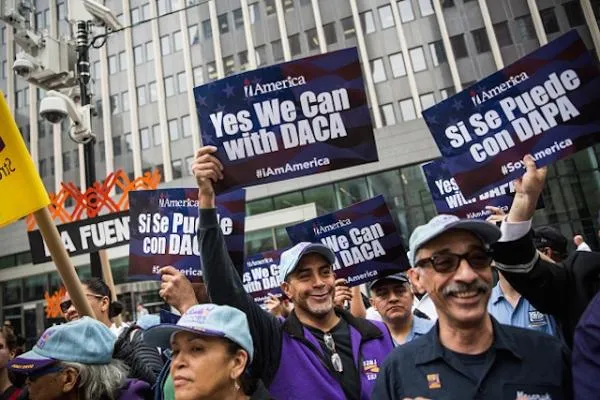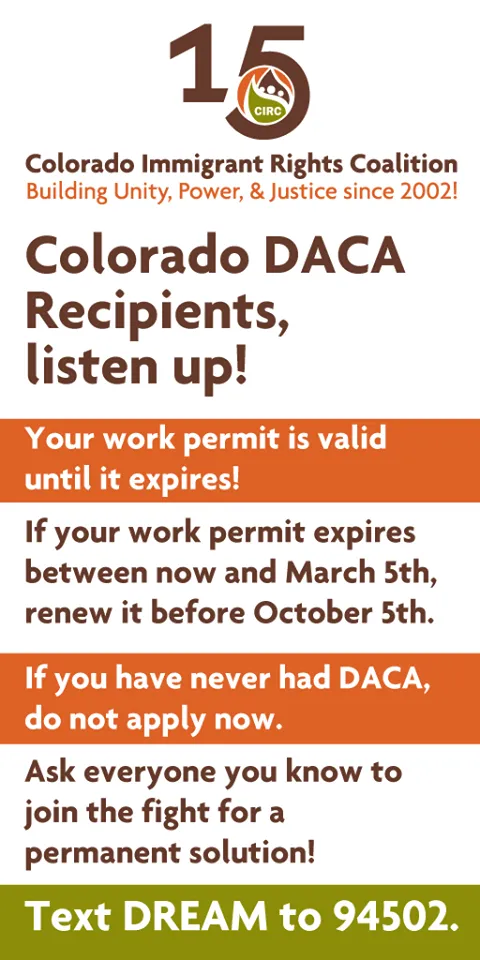Workers Rights and DACA Repeal

On September 5, 2017, President Trump directed the U.S. Department of Homeland Security (DHS) and U.S. Citizenship and Immigration Services (USCIS) to phase out and eventually end Deferred Action for Childhood Arrivals (DACA) over two and half years.
What do I need to know about the end of daca?
A guide for DACA recipients and allies
En españo: https://www.ilrc.org/sites/default/files/resources/if_daca_ends_spanish.pdf
I. Initial and Renewal Applications
As of September 5, 2017:
- USCIS will continue to process all pending INITIAL applications ACCEPTED as of September 5, 2017.
- USCIS will reject all other new INITIAL applications.
- USCIS will continue to process all pending RENEWAL applications that have already been filed.
- USCIS will continue to accept and process RENEWAL applications until October 5, 2017 from applicants whose DACA expires between September 5, 2017 and March 5, 2018. DACA recipients whose DACA has already expired are no longer eligible to renew.
- USCIS will reject all INITIAL and RENEWAL applications received after October 5, 2017.
IMPORTANT: Individuals with a current, unexpired grant of DACA will continue to hold DACA until it expires. This means that current DACA recipients maintain their protection from deportation and work permit until their current expiration date. USCIS will not refer DACA recipients and applicants to U.S. Immigration and Customs Enforcement (ICE) for deportation unless they meet USCIS’ Notice to Appear guidance or post a risk to national security or public safety. Applicants with currently pending and processing applications should attend biometrics appointments and respond to any requests for additional evidence they receive from USCIS.
If you are eligible to renew under the above guidelines, you should do so immediately and file with enough time for your application to be delivered to and accepted by USCIS by October 5, 2017. Renewal applications must be accepted (and not just postmarked) by October 5, 2017 to ensure that your application is processed. For more information, see the government’s Frequently Asked Questions and memorandum on the end of DACA
iI. Work Permits
Employment Authorization Documents (EADs), also known as work permits, are generally valid until they expire or the government demands they be returned. Unless the government demands that you return your work permit, the following points should apply.
- If you currently have an unexpired work permit under DACA, you are allowed to keep your work permit, you have the right to work legally until your work permit’s expiration date.
- You have no obligation to inform your employer that DACA has ended. Your employer does not have the right to ask you whether you are a DACA recipient or how you got your work permit.
- Even though DACA is winding down, your employer does not have the right to fire you, put you on leave, or change your work status until after your work permit has expired. If your expiration date is nearing, your employer may ask you for an updated work permit but cannot take any action against you until after it is expired.
- For more information about your rights as an employee see this advisory by the National Immigration Law Center: https://www.nilc.org/issues/daca/daca-and-workplace-rights/.
III. Social Security numbers
Your SSN is a valid SSN number for life, even once your work permit and DACA approval expires.
- If you have not done so already, apply for a SSN while your DACA and work permit are still valid.
- You can and should continue to use the SSN you got under DACA as your SSN even after your work permit expires. You can use your SSN for education, banking, housing and other purposes.
- Your SSN contains a condition on it that requires a valid work permit to use it for employment purposes.
IV. driver's licenses and other identification cards
If you have not already done so, apply for a driver’s license or state identification card if your DACA is still valid and that makes you eligible for a driver’s license or state-issued identification card. all foreign nationals residing in Colorado, including those with DACA, receive a restricted driver’s license with the black bar.
- The restriction limits the Colorado driver’s license to state identification and driving purposes and is valid for identification purposes such as opening a bank account and auto registration. Importantly, because the restricted license is not valid for federal identification purposes, it cannot be used as an identification document to complete federal form I-9. Thus, employers may not accept the restricted Colorado driver’s license when completing federal Form I-9.
- In Colorado, you will need your work authorization card, your passport or birth certificate, proof of current residence AND also your Social Security Card.
- Proof of residence can include one of these items: Utility bill, Credit card statement, student ID or bill, Pay stub or earnings statement, Rent receipt, Telephone bill, Transcript or report card from an accredited school, Bank statement, Mortgage document, Tax document, Homeowners/renter’s insurance policy, Vehicle registration.
v. travel on advanced parole
DACA recipients should be cautious about travel on advanced parole.
- If you are outside the country with advance parole, make sure to return right away and while your advance parole and EAD are valid. If the DACA program ends, it is not clear that people with advance parole based on DACA will be able to return. The safest route is to return as soon as possible, before an announcement ending DACA.
- If you have been granted advance parole under DACA but have not yet left the United States, or are interested in applying for advance parole, speak with an attorney to determine potential risks before doing anything.
vI. other immigration options
Many DACA recipients may be eligible for another immigration option to get a work permit or even a green card.
- Talk to an immigration services provider to understand your legal options and if you might be eligible for another immigration benefit. Find low-cost immigration legal services: https://www.immigrationlawhelp.org.
- Avoid fraudulent service providers: confirm their credentials, ask for a written contract and a receipt for any payments, and if you have doubts, get a second opinion.
VII. criminial issues
Any criminal arrest, charge, or conviction can put you at risk with immigration authorities.
- Avoid contact with law enforcement that may result in a criminal arrest. If you end up being arrested, make sure to consult an expert immigration attorney.
- If you have a criminal conviction, find out if it can be changed to lessen the impact on a future immigration case you may have.
ViII. know your rights
Everyone – both documented and undocumented persons have rights in this country. At all times, carry a red card to exercise your right to remain silent in case you are stopped or questioned by ICE (https://www.ilrc.org/red-cards).

IX. updates and information
Follow the news carefully and go to reliable sources for information on the status of the DACA and other immigration programs. Don’t fall for scams about new fees or false information about your DACA work permit. Good sources of information include www.unitedwedream.org, www.informedimmigrant.com, www.defenddaca.com, www.ilrc.org, www.nilc.org and www.weareheretostay.org.
Information provided by the Immigrant Legal Resource Center: https://www.ilrc.org/sites/default/files/resources/community_advisory_-_end_of_dacav2.pdf

